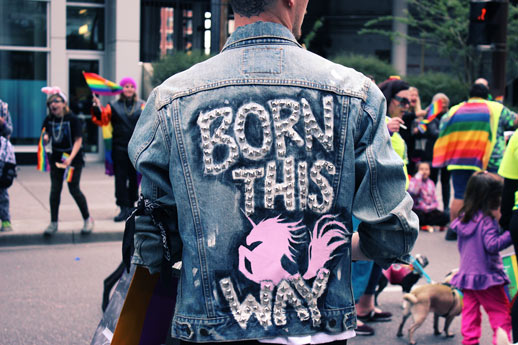
What to do when people use religion as an excuse for homophobia

I can’t remember the first time I said “I’m an atheist” or when I consciously decided that I no longer believed in God. It was such a gradual process over the course of my childhood and teen years, that I don’t have one big eureka-type moment in which the light bulb came on and I made a choice to leave the church.
The first major step I took on my journey towards becoming a proud, and sometimes loud atheist, was probably when I was twelve and the time came to choose a high school. The small, very conservative town I grew up in had one public high school with about two hundred students. The catholic high school that we were all expected to attend was a forty five minute bus ride away. I think the biggest reason I chose to stick to the public high school that was local was because I hated the idea of wearing a uniform. My elementary school had been staunchly catholic, and I’ll get to that in a minute, but at least we got to pick our own clothes every day. Out of my grade eight graduating class of seventeen students only four of us went to the local public school, everyone else went to the catholic school forty five minutes away.
High school was my first experience with a school day that did not start and end with prayer, along with some in the middle. Before that my day would start with singing our national anthem and then prayer. We would pray before each snack time or our lunch break and pray again at the end of the day. Every Wednesday the local catholic priest came to our school and spent about forty five minutes preaching to each class. On Friday mornings the first hour and a half of the day were dedicated to mass. This wasn’t so bad when our school shared its property with the local Catholic Church, I should say here that I am specifying Catholic Church because while my hometown had only two thousand people, it had seven churches. Sometime in fourth grade we moved to a new school building as our population had outgrown the old one, this put us on the other side of town from the church building, but we still attended mass every Friday, we just did it in the gymnasium. The drawback to this was that we were still expected to go through all the motions of a regular church mass, and if you’ve never attended a proper catholic ceremony allow me to explain. We weren’t given chairs, as putting them out and putting them away would have eaten up too much time, so we sat on the bare floor. We then had to stand for every hymn, usually three or four throughout the mass, and kneel for prayer at least twice. Even with the fans going and the back door of the gymnasium opened I witnessed young students getting sick, and once an older student fainted in the middle of service.
There were other religious ideas that informed our school day as well, the biggest example I can think of comes from my last year at the school when we were all expected to take the sacrament of confirmation. I won’t bore you here with the details about the seven sacraments of the Catholic Church, but this one in particular was a ceremony for teenagers in which you reaffirm your beliefs and dedication to the church. It involves a family sponsor and choosing a middle name for yourself that has religious roots. It was presented to us a pretty big deal at the time, and we spent a not small amount of our grade 8 year creating beautiful binders, wrapped in cloth and batting and edged with lace, we researched and completed different projects all meant to lead us on a path to the church etc. I have no idea where my binder is now, but I do know that when I started grade nine at the local high school I was woefully behind in certain subjects. For a top student this was distressing, and the first time I remember thinking that religion was a waste of time, I was 13. At the time I was angry at my teachers, and angry at the church, the concept of religious belief itself because I felt that it had taken something away from me. I was lacking, behind the other students, which was not a place I was used to being or was comfortable being, I had to put in extra time after school and on lunch breaks to get caught up on what I hadn’t been taught. I remember thinking then that if I went on to have children of my own they would definitely not be attending the same catholic school that I did.
After that religion wasn’t a big part of my life, but there are parts of it that never go away. Certain things they teach you about your body and yourself, interacting with members of the opposite sex for example, that are very difficult to get over. I count myself lucky in one regard that I had a very open minded father and when I started to question the things we had been taught, especially when it came to science, he encouraged me to make my own choices. I don’t think he would even go so far as to call himself an atheist, but he did point me in the right direction. One thing I have learned, having known so many people that have stepped away from the church in their later years, is that the term atheist seems to be somewhat scary. I know people, like my father, whose beliefs line up very closely with my own, but they won’t say the A word, won’t go so far as to call themselves atheists and when I say things like “I do not believe in God” they get uncomfortable, even though they probably don’t either, they don’t attend church, haven’t prayed in years and so on. It seems to be a difficult connection to sever completely.
Eventually after lots of research and self-examination I came to the conclusion that I am an atheist. More recently, into my thirties, it comes so naturally to me that reflecting on my childhood I have trouble wrapping my head around the fact that I ever believed the stories they were telling us. In addition to moving away from my small, conservative and very religious home town, I ended up choosing to homeschool my own children, and let me tell you being an atheist homeschooler, it’s a small, small boat I’m in. I worked very hard not to influence my children’s beliefs, however I never shied away from telling them what I did and did not believe was true. I also have bibles available for reading if they are interested, but both of them seem to have found their way to atheism as well, with one telling me that the bible didn’t make sense, and the other being so staunchly scientific that he would never believe me if I told him the universe was made in seven days.
After eight years of continuous, sometimes over bearing religious education, I still came to believe that the bible itself is a work of fiction. It’s a collection of wonderful stories to help teach people the best ways to behave, sometimes. There are some very outdated teachings in there too that really need to be let go. It also contains metaphors and stories to explain the universe, in the same way that the Norse believed Thor threw the lightening in a thunderstorm, or in Ancient Greece that Apollo pulled the sun across the sky in his great chariot. To me all these stories belong in the same category, that of myths and legends. And while I absolutely think that everyone has the right to believe what they want and would never belittle someone else’s beliefs, when those beliefs start taking over the education system and interfering with children getting taught scientific fact, then it becomes a problem not just for me, but for all of us. We are counting on this next generation to take over for us, and how can they do that if they are misinformed? When we allow religious education to take over the school system that is what we get.
This article was written by Emerald Baynton, author of The Scientific Homeschooler blog.